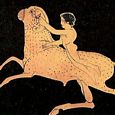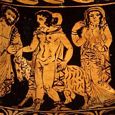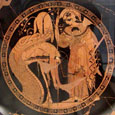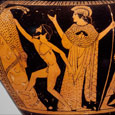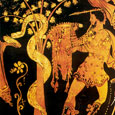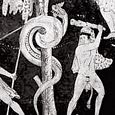KHRYSOMALLOS
Greek Name
Κριος Χρυσομαλλος
Transliteration
Krios Khrysomallos
Latin Spelling
Crius Chrysomallus
Translation
Golden-Fleeced Ram
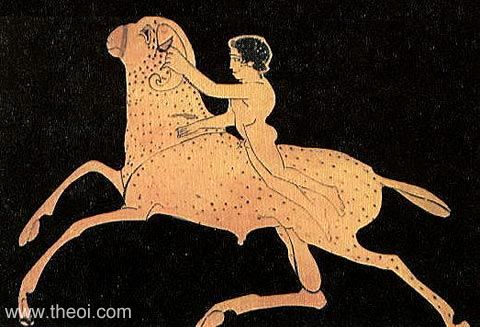
KRIOS KHRYSOMALLOS (Crius Chrysomallus) was a fabulous, flying, golden-fleeced ram. It was sent by the cloud-nymphe Nephele to rescue her children Phrixos (Phrixus) and Helle when they were about to be sacrificed to the gods. The ram carried Phrixos all the way to Kolkhis (Colchis) at the far end the Black Sea and then instructed the boy to sacrifice him to the gods and lay his fleece in the grove of Ares. Khrysomallos was afterwards placed amongst the stars as the constellation Aries and his shining fleece became the goal of the quest of Iason (Jason) and the Argonauts.
FAMILY OF CHRYSOMALLUS
PARENTS
POSEIDON & THEOPHANE (Hyginus Fabulae 188, Ovid Metamorphoses 6.118)
ENCYCLOPEDIA
CHRYSOMALLUS. In consequence of the intrigues of Phrixus' stepmother, Ino (others state that he offered himself), he was to be sacrificed to Zeus; but his mother Nephele removed him and Helle, and the two then rode away on the ram with the golden fleece, the gift of Hermes, through the air. According to Hyginus (Fab. 3), Phrixus and Helle were thrown by Dionysus into a state of madness, and while wandering about in a forest, they were removed by Nephele. Between Sigeum and the Chersonesus, Helle fell into the sea which was afterwards called after her the Hellespont; but Phrixus arrived in Colchis, in the kingdom of Aeetes, who gave him his daughter Chalciope in marriage (comp. Schol. ad Apollon. Rhod. ii. 1123, 1149). Phrixus sacriticed the rain which had carried him, to Zeus Phyxius or Laphystius (Schol. ad Apollon. Rhod. ii. 653; Paus. i. 24. § 2), and gave its skin to Aeetes, who fastened it to an oak tree in the grove of Ares.
Source: Dictionary of Greek and Roman Biography and Mythology.
CLASSICAL LITERATURE QUOTES
BIRTH OF THE GOLDEN-FLEECED RAM
Pseudo-Hyginus, Fabulae 188 (trans. Grant) (Roman mythographer C2nd A.D.)
:
"Theophane, a most beautiful maiden, was the daughter of Bisaltes. When many suitors sought her from her
father, Neptunus [Poseidon] carried her off and took her to the island of Crumissa. When the suitors knew she
was staying there, they secured a ship and hastened to Crumissa. To deceive them, Neptunus changed Theophane
into a very beautiful ewe, himself into a ram, and the citizens of Curmissa into cattle. When the suitors came
there and found no human beings, they began to slaughter the herds and use them for food. Neptunus saw that the
men who had been changed to cattle were being destroyed, and changed the suitors into wolves. He himself, in ram
form, lay with Theophane, and from this union was born the Golden-fleeced Ram (Aries Chrysomallus)
which carried Phrixus to Colchis, and whose fleece, hung in the grove of Mars [Ares], Jason took away."
Ovid, Metamorphoses 6. 118 ff (trans. Melville) (Roman epic C1st B.C. to C1st A.D.)
:
"[Theophane] Bisaltes child, he [Neptune-Poseidon] cheated as a ram."
PHRIXUS, HELLE & THE GOLDEN-FLEECED RAM
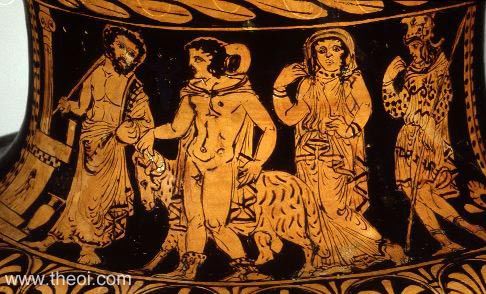
Hesiod, Catalogues of Women & Eoiae Fragment 38 (from Eratosthenes, Catasterismoi
24. 124) (trans. Evelyn-White) (Greek epic C8th or C7th B.C.) :
"The Ram (Krios). This it was that transported Phrixos (Phrixus) and Helle. It was immortal and
was given them by their mother Nephele, and had a golden fleece, as Hesiod and Pherecydes say."
Pseudo-Hesiod, Aegimius Fragment 1 (from Scholiast on Apollonius Rhodius, Argonautica
3. 587) (trans. Evelyn-White) (Greek epic C8th or C7th B.C.) :
"Phrixos (Phrixus) was received without intermediary because of the fleece and so holding the fleece he
walked into the halls of Aeetes."
Pindar, Pythian Ode 4. 156 ff (trans. Conway) (Greek lyric C5th B.C.) :
"[Pelias commands Iason (Jason) fetch the Golden Fleece :] ‘You have it in your strength to undo the
vengeful anger of the powers of earth below. To bring his spirit again Phrixos (Phrixus) commands us journey to
Aietes (Aeetes) hall, and fetch from thence the thick fleece of the ram, which saved him from the sea long ago,
and from the impious darts of his step-mother [Ino].’"
Pseudo-Apollodorus, Bibliotheca 1. 80 (trans. Aldrich) (Greek mythographer C2nd A.D.)
:
"The oracle prophesied an end to the dearth if Phrixos (Phrixus) were to be sacrificed to Zeus. When
Athamas heard this and was pressured by the joint efforts of the inhabitants, he had Phrixos placed on the
altar. But Nephele seized both him and her daughter, and gave them a golden-fleeced ram which she had received
from Hermes, by which they were borne through the sky over and across the land and the sea. But as they reached
teh sea that lies between Sigeion (Sigeum) and the Kherronesos (Cherronese), Helle slipped into the depths; from
her death there the sea was called the Hellespontos (Hellespont) after her. Phrixos proceeded on to the
Kholkians (Colchians), who were ruled by Aeetes, the son of Helios and Perseis, and brother of Kirke (Circe) and
Minos' wife Pasiphae. Aeetes received him and gave him Khalkiope (Chalciope), one of his daughters. Phrixos
sacrificed the golden-fleeced ram to Zeus Phyxios, but gave its fleece to Aeetes, who nailed it to an oak tree
in a grove of Ares."
Apollonius Rhodius, Argonautica 1. 255 ff (trans. Rieu) (Greek epic C3rd B.C.)
:
"[Ladies converse at the launching of the ship Argo :] ‘How I wish that the dark waves in which the
lady Helle perished had closed over Phrixos (Phrixus) and his ram [i.e. the golden-fleeced ram] as well.
Instead, the wicked monster actually spoke to him. Hence all this misery and heartache for Alkimede (Alcimede)
[Iason's (Jason's) mother].’"
Apollonius Rhodius, Argonautica 2. 1141 ff :
"[Argos addresses his fellow Argonauts :] ‘An Aeolid called Phrixos (Phrixus) came to Aea from
Hellas. He reached Aeetes' city on the back of a ram which Hermes had turned into gold - you can still see its
fleece, spread on the leafy branches of an oak. Phrixos sacrificed the ram at its own suggestion to Zeus alone,
because he is the god of fugitives; and Aeetes made him welcome in his palace.’"
Apollonius Rhodius, Argonautica 1. 763 ff :
"[Amongst the images embroidered on the mantle of Jason by the goddess Athene (Athena) :] Phrixos (Phrixus)
the Minyan was also shown together with his [golden-fleeced] ram. So vividly were they portrayed, the ram
speaking and Phrixos listening, that as you looked you would have kept quiet in the fond hope of hearing some
wise words from their lips."
Apollonius Rhodius, Argonautica 2. 650 ff :
"The outfall of the River Phyllis [on the Black Sea coast]. It was here that Phrixos (Phrixus) son of
Athamas had been entertained by Dipsakos (Dipsacus) when he was flying with his Ram from the city of Orkhomenos
(Orchomenus)."
Apollonius Rhodius, Argonautica 4. 113 ff :
"They [Medea and Jason] landed on a lawn called the Ram's Bed, as it was there that the ram that carried
Minyan Phrixos (Phrixus) on its back first flexed his weary knees. Near by, begrimed by smoke, was the base of
the altar that Phrixos had set up to Zeus, the friend of fugitives, when he sacrificed the golden wonder, as
Hermes had bidden him to do when he met him on the way.
Pausanias, Description of Greece 1. 24. 2 (trans. Jones) (Greek travelogue C2nd A.D.)
:
"There is also a statue of Phrixos (Phrixus) [on the Akropolis (Acropolis) of Athens] the son of Athamas
carried ashore to the Kolkhians (Colchians) by the [golden-fleeced] ram. Having sacrificed the animal to some
god or other, presumably to the one called the the Orkhomenians Laphystios, he has cut out the thighs in
accordance with Greek custom and is watching them as they burn."
Pausanias, Description of Greece 9. 34. 5 (trans. Jones) (Greek travelogue C2nd A.D.)
:
"[Mount Laphystios (Laphystius) in Boiotia :] When Athamas was about to sacrifice here Phrixos (Phrixus)
and Helle, a ram with his fleece of gold was sent by Zeus to the children, and that on the back of his ram they
made good their escape."
Diodorus Siculus, Library of History 4. 47. 1 - 6 (trans. Oldfather) (Greek historian
C1st B.C.) :
"Phrixos (Phrixus), the son of Athamas, the myths relate, because of his stepmother's plots against him,
took his sister Helle and fled with her from Greece. While they were making the passage from Europe to Asia, as
a kind of Providence of the gods directed, on the back of a Ram (krios), whose fleece was of gold
(khrysomallos), the maiden fell into the sea, which was named after her Hellespontos (Hellespont), but
Phrixos continued on into the Pontos and was carried to Kholkis, where, as some oracle had commanded, he
sacrificed the ram and hung up its fleece as a dedicatory offering in the temple of Ares. After this, while
Aeetes was king of Kolkhis (Colchis), an oracle became known, to the effect that he was to come to the end of
his life whenever strangers should land there and carry of the golden fleece. For this reason and because of his
own cruelty as well, Aeetes ordained that strangers should be offered up in sacrifice, in order that, the report
of the cruelty of the Kolkhoi (Colchians) having been spread abroad to every part of the world, no stranger
should have the courage to set foot on the land. He also threw a wall about the precinct and stationed there
many guardians, these being men of the Tauric Chersonese, and it is because of these guards that the Greeks
invented monstrous myths. For instance, the report was spread abroad that there were fire-breathing Tauroi
(Bulls) round about the precinct and that a sleepless Drakon (Dragon) guarded the fleece . . .
Also the account of Phrixos underwent a similar working into a myth. For, as some men say, he made his voyage
upon a ship which bore the head of a ram upon its bow, and Helle, being troubled with sea-sickness, while
leaning far over the side of the boat for this reason, fell into the sea . . .
Phrixos and his attendant (Krios) were taken captive [by Aeetes] . . . The attendant whose name was Krios (Ram),
was sacrificed to the gods, and when his body had been flayed the skin was nailed up on the temple, in keeping
with a certain custom. And when later an oracle was delivered to Aeetes to the effect that he was to die
whenever strangers would sail to his land and carry off the skin of Krios, the king, they say, built a wall
about the precinct and stationed a guard over it; furthermore, he gilded the skin in order that by reason of its
brilliant appearance the soldiers should consider it worthy of the most careful guarding."
Philostratus the Elder, Imagines 2. 15 (trans. Fairbanks) (Greek rhetorician C3rd
A.D.) :
"In Kolkhis (Colchis) is preserved a golden fleece, the fleece of the ancient ram that ferried Helle with
Phrixos (Phrixus) across the sky, as the story goes."
Pseudo-Hyginus, Fabulae 3 (trans. Grant) (Roman mythographer C2nd A.D.) :
"While Phrixus and Helle under madness sent by Liber [Dionysos] were wandering in a forest, Nebula
[Nephele] their mother is said to have come there bringing a gilded ram, offspring of Neptune [Poseidon] and
Theophane. She bade her children to mount it, and journey to Colchis to King Aeetes, son of Sol [Helios], and
there sacrifice the ram to Mars [Ares]. This they were said to have done, but when they had mounted, and the ram
had carried them over the sea, Helle fell from the ram; from this sea was called Hellespont. Phrixus, however,
was carried to Colchis, where, as his mother had bidden, he sacrificed the ram, and placed its gilded fleece in
the temple of Mars--the very fleece which, guarded by a dragon, it is said Jason, son of Aeson and Alcimede,
came to secure."
Pseudo-Hyginus, Astronomica 2. 20 (trans. Grant) (Roman mythographer C2nd A.D.)
:
"[Constellation] Aries the Ram. This is thought to be the ram which carried Phrixus and Helle thought the
Hellespont. Hesiod and Pherecydes [mythographer C5th B.C.] say that it had a fleece of gold; about his we shall
speak at greater length elsewhere. Many have said that Helle fell into the Hellespont, [and] was embraced by
Neptune [Poseidon] . . . Phrixus, on coming safely to Aeetes, sacrificed the ram to Jove [Zeus], and hung the
fleece up in the temple. The image of the ram itself, put among the constellations by Nubes [Nephele], marks the
time of year when grain is sown, because Ino earlier sowed it parched--the chief reason for the flight.
Eratosthenes [Greek poet C3rd BC] says that the ram itself removed its golden fleece, and gave it Phrixus as a
memorial, and then came of its own accord to the stars; for this reason it seems somewhat dim, as we said before
. . .
Stirred by this report [i.e. the false accusation that Phrixus attacked his wife], Cretheus, as was fitting for
one who deeply loved his wife and was king, persuaded Athamas to put Phrixus to death. However, Nubes
intervened, and rescuing Phrixus and Helle his sister, put them on the ram, and bade them flee as far as they
could through the Hellespont Helle fell off and paid the debt to nature, and the Hellespont was nemd from her
name. Phrixus came to the Colchians, and, as we have said, hung up the fleece of the slain ram in a
temple."
Ovid, Fasti 3. 853 ff (trans.Boyle) (Roman poetry C1st B.C. to C1st A.D.)
:
"The seeds were burnt by the wicked stepmother's [Ino's] trick and no customary grain had sprouted. A
messenger visits the oracle to fetch Delphi's sure help for the barren earth. Corrupt like the seed, he reports
the oracle seeks the deaths of Helle and young Phrixus. People, time and Ino compelled a stubborn king to endure
the unspeakable orders. Phrixus and his sister, headbands scarfing their brows, stand at the altars and wail
their joint fate. Their mother [Nephele the cloud-nymphe] sees them as she hangs upon the air, and hammers her
naked breast in shock. She dives into the Dracon-born city [Thebes], enveloped in clouds, and snatches her
children away. She provides a Ram shimmering with gold for their escape: it carries the two across the wide
seas. They say the girl's left hand clutched the horn weakly, when she named the water after herself. Her
brother almost died with her, as he tried to stop her falling and offered his outstretched hands. He wept that
he lost his partner in twin peril, unaware she had joined the blue god [Poseidon]. On reaching land, the ram
becomes a star, but its wool of gold reaches the houses of Colchis."
Ovid, Heroides 18. 143 ff (trans. Showerman) (Roman poetry C1st B.C. to C1st A.D.)
:
"[Leandros (Leander), swimming across the Hellespont, speaks :] ‘I envy Phrixus, whom the ram with
gold in its woolly fleece bore safely over the stormy seas.’"
Ovid, Heroides 19. 163 ff :
"Why, though Phrixus and Phrixus' sister [Helle] both rode this way [across the Hellespont], did the maiden
[Helle] alone give name to these wide waters?"
Propertius, Elegies 2. 26a (trans. Goold) (Roman elegy C1st B.C.) :
"Helle tossed on the purple waves, whom the Golden Ram carried on his fleecy back."
Seneca, Troades 1034 ff (trans. Miller) (Roman tragedy C1st A.D.) :
"Phrixus mourned because Helle fell, when the flock's leader, resplendent with golden fleece, bore brother
and sister on his back together, and in mid-sea lost half his burden."
Valerius Flaccus, Argonautica 1. 280 ff (trans. Mozley) (Roman epic C1st A.D.)
:
"[Orpheus sang of how] Phrixus stood, his temples bound about with fillets, of how he fled from the sinful
altar veiled in cloud, and Athamas to Learchus, Ino's son; of how the Golden-Ram bore the lad into the pitying
waves, of how Helle sat grasping the horns. Seven times had Aurora (the Dawn) [Eos] fulfilled her course, and
seven nights had Luna (the Moon) [Selene] completed in heaven, when Sestos, that from afar the waters seemed not
to sunder from Abydos, began to part from its twin city. Then the sister [Helle] whose name shall live for a
time forsakes Aeolus' son [Phrixos], saved, alas! in vain from her cruel stepmother. Still with weary hands she
strains far behind the wet fleece, but the waves draw down her garments heavy now with the drenching water, and
her hands slip off the smooth gold. What grief was thine, Phrixus, when rapt on by the whirling tide thous didst
look back and see the face of the hapless maid as she called to thee--her hands only--then her hair spread out
upon the waters."
Valerius Flaccus, Argonautica 5. 228 ff :
"When at last he [Phrixos (Phrixus)] died [of old age], on a sudden appeared a marvellous flame in heaven,
and the Ram in a vast constellation stirring up all the sea."
Nonnus, Dionysiaca 10. 67 ff (trans. Rouse) (Greek epic C5th A.D.) :
"[Ino, stepmother of Phrixos (Phrixus), laments :] ‘Nephele sends the Erinyes (Furies) after me, that
I may die in this sea where maiden Helle fell. I have heard that Phrixos was carried through the air to the
Kolkhian (Colchian) country, guiding aloft the Ram who took him off, and he still lives in a distant land. O
that my son Melikertes (Melicertes) too might escape to another country, and travel the high path of the
Gold-fleece Ram (Krios Khrysopokos)!’"
JASON & THE GOLDEN FLEECE
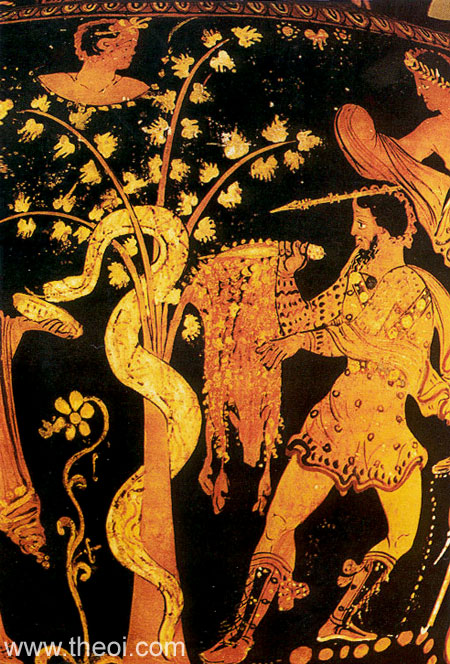
Pindar, Pythian Ode 4. 156 ff (trans. Conway) (Greek lyric C5th B.C.) :
"[Pelias commands Iason (Jason) fetch the Golden Fleece :] ‘You have it in your strength to undo the
vengeful anger of the powers of earth below. To bring his spirit again Phrixos commands us journey to Aietes'
(Aeetes') hall, and fetch from thence the thick fleece of the ram, which saved him from the sea long
ago.’"
Simonides, Fragment 576 (from Scholiast on Euripides' Medea) (trans. Campbell, Vol.
Greek Lyric II) (Greek lyric C6 to 5th B.C.) :
"Some call it all-gold [the Golden Fleece], others purple. Simonides in his hymn to Poseidon says it was
dyed with the sea-purple."
Simonides, Fragment 576 (from Scholiast on Apollonius of Rhodes' Argonautica) :
"Many have called the skin golden, and Apollonios followed them. Simonides sometimes calls it white,
sometimes purple."
Pseudo-Apollodorus, Bibliotheca 1. 109 (trans. Aldrich) (Greek mythographer C2nd
A.D.) :
"[Pelias] commanded Iason (Jason) to go after the [golden] fleece, which was in Kolkhis (Colchis) in a
grove of Ares, hanging from an oak tree, and guarded by an ever wakeful serpent."
Apollonius Rhodius, Argonautica 4. 165 ff (trans. Rieu) (Greek epic C3rd B.C.)
:
"Lord Iason (Jason) held up the great fleece in his arms. The shimmering wool threw a fiery glow on his
fair cheeks and forehead; and he rejoiced in it, glad as a girl who catches on her silken gown the lovely light
of the full moon, as it climbs the sky and looks into her attic room. The ram's skin with its golden covering
was as large as the hide of a yearling heifer or a brocket, as a young stag is called by hunting folk. The long
flocks weighed it down and the very ground before him as he walked was bright with gold. When he slung it on his
left shoulder, as he did at times, it reached his feet. But now and again he made a bundle of it in his arms. He
was mortally afraid that some god or man might rob him on the way.
Dawn was spreading over the world when they rejoined the rest. The young men marvelled when they saw the mighty
fleece, dazzling as the lightning of Zeus, and they all leapt up in their eagerness to touch it and hold it in
their hands. But Iason kept them off and threw a new mantle over the fleece."
Apollonius Rhodius, Argonautica 4. 1141 ff :
"[In a cave on the island of the Phaiakians (Phaeacians) Jason and Medea consumate their marriage :] It was
here that they prepared a great bed, spreading the shining golden fleece on top of it, to grace the wedding and
make it famous in story. Nymphai (Nymphs) gathered flowers for them, and as they brought the many-coloured
bunches into the cave in their white arms the fiery splendour of the fleece played on them all, so bright was
the glitter of its golden wool. It kindled in their eyes a sweet desire. They longed to lay their hands on it,
and yet they were afraid to touch it."
Strabo, Geography 11. 2. 19 (trans. Jones) (Greek geographer C1st B.C. to C1st A.D.)
:
"The Soanes [a tribe of the Kaukasos (Caucasus) Mountains near Kolkhis (Colchis)] . . . It is said that in
their country gold is carried down by the mountain torrents, and that the barbarians obtain it by means of
perforated troughs and fleecy skins, and that this is the origin of the myth of the Golden Fleece."
Diodorus Siculus, Library of History 4. 40. 4 (trans. Oldfather) (Greek historian
C1st B.C.) :
"He [Pelias] urged Iason (Jason) to undertake an exploit by sailing to Kolkhis (Colchis) after the renowned
golden-fleeced skin of the ram."
Philostratus the Elder, Imagines 2. 15 (trans. Fairbanks) (Greek rhetorician C3rd
A.D.) :
"The purpose of the voyage [of the Argonauts] was as follows : In Kolkhis (Colchis) is preserved a golden
fleece, the fleece of the ancient ram that ferried Helle with Phrixos (Phrixus) across the sky, as the story
goes. Iason (Jason), my boy, undertakes the task of securing this fleece--a task indeed, for to guard the fleece
a drakon of fear-inspiring look and disdainful of sleep holds it encircled in his coils."
Philostratus the Elder, Imagines 2. 17. 6 :
"This creature [the drakon (dragon)] is said to be devoted to gold and whatever golden thing it sees
it loves and cherishes; thus the fleece in Kolkhis (Colchis) and the apples of the Hesperides, since they seemed
to be of gold, two drakones (dragon-serpents) that never slept guarded and claimed as their own."
Philostratus the Younger, Imagines 8 (trans. Fairbanks) (Greek rhetorician C3rd A.D.)
:
"You have heard, I am sure, about the prize which was the object of this voyage [of the Argo], since poets
tell of ‘the golden fleece.’"
Philostratus the Younger, Imagines 11
"[From a description of an ancient Greco-Roman painting :] After the contest with the bulls Medeia (Medea)
has charmed this drakon (dragon-serpent) to sleep, the ‘ram's fleece of golden wool’ has been seized
as booty, and the crew of the Argo have now set forth in hasty flight, inasmuch as the maiden's deeds have
become known to the Kolkhians (Colchians) and Aietes (Aeetes)."
Pseudo-Hyginus, Fabulae 12 (trans. Grant) (Roman mythographer C2nd A.D.) :
"[Pelias] bade him [Jason] procure from King Aeetes, his enemy, the golden fleece of the ram which Phrixus
had dedicated to Mars [Ares] at Colchis."
Pseudo-Hyginus, Fabulae 22 :
"An oracle told Aeetes, son of Sol [Helios], that he would keep his kingdom as long as the fleece which
Phrixus had dedicated should remain in the shrine of Mars [Ares]."
Ovid, Metamorphoses 7. 7 (trans. Melville) (Roman epic C1st B.C. to C1st A.D.)
:
"Going to the king [Aeetes] they [the Argonauts] claimed the famous Golden Fleece and learnt the fearful
terms and monstrous toils imposed."
Ovid, Heroides 6. 1 ff (trans. Showerman) (Roman poetry C1st B.C. to C1st A.D.)
:
"You [Jason] are said to have touched the shores of Thessalia (Thessaly) with safe-returning keel, rich in
the fleece of the golden ram."
Ovid, Heroides 6. 13 ff :
"The spoil of the ram, the deep-gold fleece the unsleeping Dracon (Dragon) guarded, had nevertheless been
stolen away by your [Jason's] bold hand."
Ovid, Heroides 6. 102 ff :
"And someone of the partisans of Pelias imputes your [Jason's] deeds to her poisons, and wins the people to
believe : ‘This fleece of gold from the ram of Phrixus the son of Aeson did not seize away, but the
Phasian girl, Aeëtes child.‘"
Ovid, Heroides 12. 7 ff :
"Why was the ship [Argo] from the forests of Pelion ever driven over the seas by strong young arms in quest
of the ram of Phrixus?"
Ovid, Heroides 12. 101 ff :
"All a-bristle with rattling scales, come the unsleeping sentinel [the dragon-serpent], hissing and
sweeping the ground with winding belly . . . I [Medea] closed the lids of the flame-like eyes in slumber wrought
by my drug, and gave into your [Jason's] hand the fleece to steal away unharmed."
Ovid, Heroides 12. 127 ff :
"Unharmed and victorious you [Jason] return to Haemonia's towns, and the golden fleece is laid before your
fathers' gods."
Ovid, Heroides 12. 199 ff :
"[Medea laments Jason's betrayal :] ‘Where is my dowry, you ask? On the field I counted it out--that
field which you had to plough before you could bear away the fleece. The famous golden ram, sightly for deep
flock, is my dowry--the which, should I say to you "Restore it!" you would refuse to render
up.’"
Seneca, Hercules Furens 465 ff (trans. Miller) (Roman tragedy C1st A.D.) :
"[Medea rebukes Jason :] ‘O ungrateful man . . . Think, too, on the long-sought spoil of the ram of
Phrixus, the sleepless dragon (monstrum), bidden to close his eyes [by Medea] in unknown
slumber.’"
Valerius Flaccus, Argonautica 1. 55 ff (trans. Mozley) (Roman epic C1st A.D.)
:
"[Pelias commands Jason fetch the Golden Fleece :] ‘Bring back the fleece of Nephele's ram to its
Grecian sanctuary, and think not thyself too frail for so perilous a task.’ . . . [But Pelias] no word
spake he of the . . . fleece held by the monstrous Dracon (Dragon)."
Valerius Flaccus, Argonautica 1. 504 ff :
"The lord of War [Ares] gave loud assent [i.e. that Jason should not be allowed to steal the Golden Fleece]
and shook his head, for he saw the Fleece assailed that hung as a trophy in his honour."
Valerius Flaccus, Argonautica 5. 228 ff :
"The fleece had Phrixus left in Mars' [Ares'] shady grove, a conspicuous memorial of his peril, embracing
an oak tree with its glowing metal. Once too did he appear, a vast phantom . . . and a great voice spoke forth
and struck terror into [Aeetes] ‘. . . Dolour and ruin of thy realm shall abound for thee what time the
fleece is stolen from the sleep-drugged grove . . .’
He spoke, and seemed therewith to put forth his hand and proffer the fateful hide, and from the visionary gold
there poured a gleam which glanced about the coffered ceiling of the palace. Trembling [Aeetes prayed] ‘.
. . Gradivus [Ares], in whose sacred oak the fleece doth glitter, keep watch; present to aid let they arms clash
and trumpets sound in they grove and thy voice ring through the darkness.’
Scarce had he spoken, when a Serpent gliding from the Caucasian mountains, not without the will of the god,
entwined all the grove with its circling coils and looked toward the Grecian land. Therefore is he watchful to
foil all threats and the dangers foretold by Phrixus."
Valerius Flaccus, Argonautica 8. 105 ff :
"The hero [Jason] asked [Medea] by what way he should climb aloft to the summit of the gold-freighted tree
: ‘Courage,’ she cries, ‘go climb the Dracon (Dragon) himself [which Medea had put to sleep
with her magic], and set thy footsteps on his back, there in thy path!’ With no delay the child of
Cretheus [Jason] trusts her word and scales the ahs tree, high thou it soar, where still the branches guarded
the skin of ruddy hue, like to illumined cloud or to Thaumantias [Iris the Rainbow] . . . Jason snatches the
longed-for prize and the final fruit of toil, and scarce did the tree give up the memorial flight of Phrixus,
its yearlong burden, but it uttered a groan and gloomy darkness closed upon it. Forth they go by the fields,
seeking the river's farthest bank; the whole landscape flashes while the hero now wraps his body the fleece with
its starry tufts of hair, now shifts it to his neck, now folds it upon his left arm . . . But when his comrades,
who had gained the appointed river-mouth saw him through the dark distance flashing all golden, the Haemonian
crew [the Argonauts] set forth a cheer; joyfully the vessel too moves to the nearest bank to greet the youth.
Swiftly he comes, and hurls the golden fleece before him, then with the bewildered maiden leaps on board the
ship, and stands triumphant spear in hand."
Valerius Flaccus, Argonautica 8. 256 ff :
“[The wedding of Jason and Medea :] Midmost of them all [the Argonauts] in rosy radiance of youth the pair
recline on a loftier couch and upon the gold of their own fleece."
ANCIENT GREEK ART
SOURCES
GREEK
- Hesiod, Catalogues of Women Fragments - Greek Epic C8th - 7th B.C.
- Hesiod, The Aegimius Fragments - Greek Epic C8th - 7th B.C.
- Pindar, Odes - Greek Lyric C5th B.C.
- Greek Lyric III Simonides, Fragments - Greek Lyric C6th - 5th B.C.
- Apollodorus, The Library - Greek Mythography C2nd A.D.
- Apollonius Rhodius, The Argonautica - Greek Epic C3rd B.C.
- Diodorus Siculus, The Library of History - Greek History C1st B.C.
- Strabo, Geography - Greek Geography C1st B.C. - C1st A.D.
- Pausanias, Description of Greece - Greek Travelogue C2nd A.D.
- Philostratus the Elder, Imagines - Greek Rhetoric C3rd A.D.
- Philostratus the Younger, Imagines - Greek Rhetoric C3rd A.D.
- Callistratus, Descriptions - Greek Rhetoric C4th A.D.
- Nonnus, Dionysiaca - Greek Epic C5th A.D.
ROMAN
- Hyginus, Fabulae - Latin Mythography C2nd A.D.
- Hyginus, Astronomica - Latin Mythography C2nd A.D.
- Ovid, Metamorphoses - Latin Epic C1st B.C. - C1st A.D.
- Ovid, Fasti - Latin Poetry C1st B.C. - C1st A.D.
- Ovid, Heroides - Latin Poetry C1st B.C. - C1st A.D.
- Propertius, Elegies - Latin Elegy C1st B.C.
- Seneca, Medea - Latin Tragedy C1st A.D.
- Seneca, Troades - Latin Tragedy C1st A.D.
BIBLIOGRAPHY
A complete bibliography of the translations quoted on this page.
